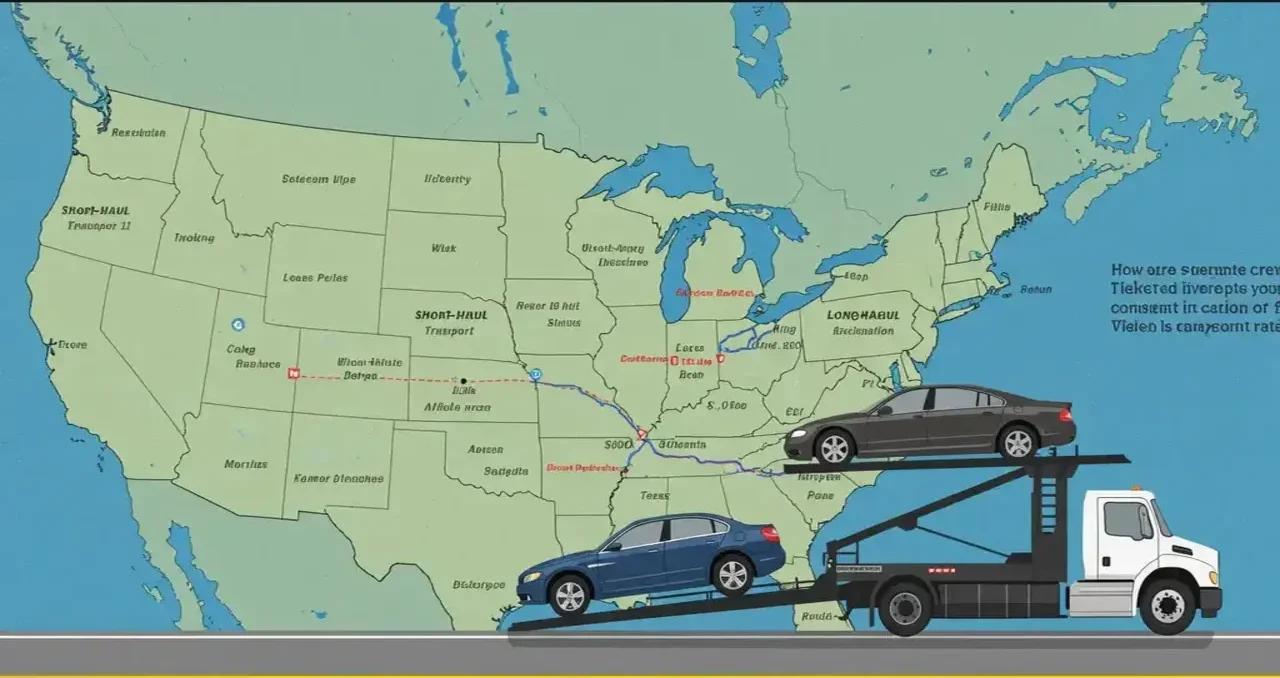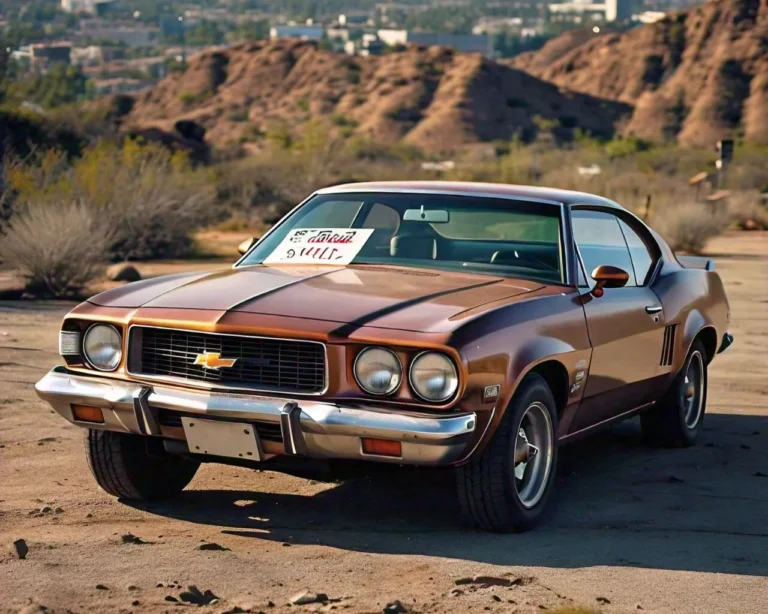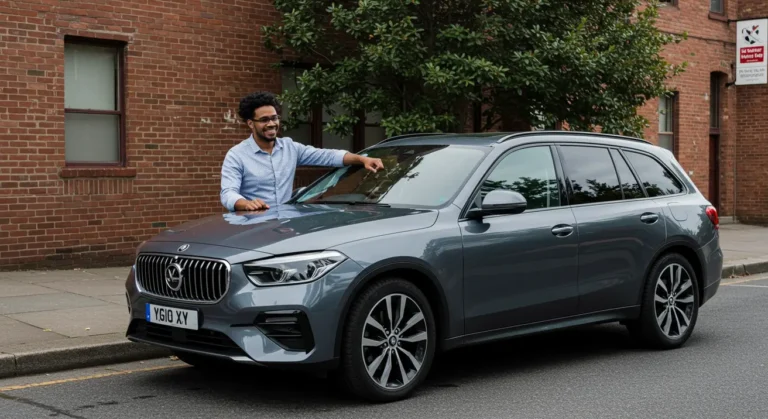State-to-State Car Shipping Costs: A Complete Guide
Introduction
Getting a car shipped from one state to another isn’t something most people do every day. So, when the need arises, the first question that comes to mind is: How much does it cost to transport a car across states?
The cost of car shipping varies based on multiple factors, including distance, transport type, vehicle condition, seasonal demand, and fuel prices. The price can be anywhere from $500 for short distances to over $2,500 for cross-country transport. Understanding these factors helps in making cost-effective decisions and avoiding unnecessary expenses.
Several groups of people regularly use state-to-state car shipping services. Families moving to a new home, military personnel relocating to a new base, online car buyers purchasing vehicles from another state, and snowbirds (people who move south for the winter) often rely on auto transport companies. Whether you need your car shipped for convenience, necessity, or a big move, knowing the costs involved ensures a smooth and stress-free experience.
Now, let’s break down what goes into the pricing of state-to-state car shipping and how you can get the best deal.

Key Factors That Influence the Cost of Transporting a Car
Shipping a car across states is not as simple as handing over the keys and waiting for it to arrive at its destination. The cost varies depending on several factors, from how far the vehicle needs to go to what kind of transport service you choose. Some costs are fixed, while others fluctuate based on market conditions.
To get an accurate estimate of your car shipping costs, you need to understand these influencing factors. Below, we break them down so you can plan your budget effectively and avoid surprises.
Distance & Route
The distance your car needs to travel is the most significant factor in pricing. Longer trips cost more overall, but the cost per mile typically decreases as the distance increases. The exact price depends on how far the transport truck must travel, the route it takes, and whether your pickup or drop-off location is in a high-demand area.
Short-Haul vs. Long-Haul Shipping Costs
Short-distance car shipping (under 500 miles) is priced higher per mile because carriers still have to cover basic expenses like fuel, tolls, and labor. The more miles the trip covers, the lower the per-mile rate.
- Short-haul transport (0–500 miles): $0.80 to $1.50 per mile.
- Mid-range transport (500–1,500 miles): $0.60 to $1.20 per mile.
- Long-haul transport (1,500+ miles): $0.40 to $0.90 per mile.
For example, a 500-mile trip might cost $500–$800, while a cross-country move of 2,500 miles could be $1,900 or more. The longer the distance, the better the rate per mile.
Pricing Trends for Popular State-to-State Transport Routes
Routes with high demand—like New York to Florida or California to Texas—often have lower prices because many carriers operate along these paths. If your route is less traveled, expect to pay more due to limited availability of transport trucks.
How Remote vs. Urban Locations Affect Transport Rates
Where you live also plays a role in pricing. Major cities are cheaper to ship from and to because they have easy access to highways and regular transport traffic. However, if you’re shipping to or from a rural area, costs may rise because carriers must take detours or travel extra miles.
If you want to save money, consider meeting the carrier at a nearby metropolitan area instead of requesting door-to-door service in a remote location.
Type of Transport: Open vs. Enclosed Carriers
The type of transport you choose affects both price and protection. You’ll need to decide between open transport (cheaper, widely used) and enclosed transport (higher cost, better protection).
Open Transport – More Affordable but Less Protection
Open carriers are the most common and budget-friendly option for car shipping. Your car is loaded onto a multi-car trailer, exposed to the elements like rain, dust, and road debris. Since more vehicles are transported at once, the cost is lower.
Best for: Standard vehicles, everyday cars, and people looking for the most affordable option.
Enclosed Transport – Best for High-Value Vehicles
Enclosed transport provides full protection by shipping cars in a covered trailer. This method is preferred for luxury, exotic, classic, and collectible cars. The downside? It can cost 40–60% more than open transport.
Best for: High-value vehicles, vintage cars, and anyone who wants extra protection.
Cost Comparison: Open vs. Enclosed Transport
| Transport Type | Average Cost | Protection Level |
| Open Transport | $600–$1,400 | Exposed to elements |
| Enclosed Transport | $1,000–$2,500 | Fully enclosed, better protection |
If you’re shipping a luxury vehicle, paying extra for enclosed transport is worth it. Otherwise, open transport is a cost-effective and widely used option.
Vehicle Type & Condition
The size, weight, and condition of your car affect how much you’ll pay for transport. The larger or heavier the vehicle, the more space it takes on a trailer, increasing shipping costs.
How Vehicle Size & Weight Affects Cost
- Small sedans & compact cars: Cheapest to transport due to low weight.
- SUVs & trucks: Cost more because they take up more space.
- Motorcycles: Often cheaper than cars but require special securing.
- Oversized vehicles & vans: Most expensive due to extra weight.
Additional Fees for Inoperable Vehicles
If your car doesn’t run, the carrier will need special equipment like a tow truck or forklift to load and unload it. This adds an extra $100–$200 to your total cost. If possible, fix minor issues before shipping to avoid extra fees.
Pickup & Delivery Options
Your choice of delivery method affects both cost and convenience.
Door-to-Door Transport – More Expensive but Convenient
With door-to-door service, the carrier picks up your vehicle as close to your specified location as possible. This option is more expensive but saves time and effort.
Terminal-to-Terminal Shipping – Cheaper but Requires Effort
With terminal-to-terminal shipping, you drop off and pick up your car at a transport hub. It’s cheaper, but you’ll need to arrange transportation to and from the terminal.
Impact of Rural vs. Metropolitan Pickups/Deliveries
- Urban areas: Lower costs due to frequent transport routes.
- Rural locations: Higher costs because extra mileage is required.
- Meeting the carrier in a nearby city can cut costs.
Shipping Time Frame: Standard vs. Expedited Delivery
The urgency of your shipment affects pricing.
Standard Shipping – Cheaper but Slower
Standard delivery follows a set schedule, meaning your car may take one to two weeks to arrive. If you don’t need immediate transport, this is the best way to save money.
Expedited Shipping – Costs More for Faster Delivery
If you need your car urgently, expedited shipping guarantees quicker pickup and delivery. However, expect to pay $200–$500 more depending on urgency and distance.
Seasonal Demand & Fuel Prices
Prices change throughout the year due to demand and fuel costs.
How Seasonal Demand Affects Pricing
- Summer: Prices rise due to high demand.
- Winter: Snowbird season increases costs.
- Spring/Fall: Usually the cheapest time for shipping.
Fuel Prices & Their Impact
If diesel prices increase, so do shipping costs. Since carriers operate on diesel fuel, rising fuel prices lead to higher transport fees.
Auto Transport Insurance
Carrier-Provided vs. Third-Party Insurance
Basic coverage is included in transport costs, but it may not cover all types of damage. Third-party insurance offers higher protection but costs extra.
How Coverage Limits Affect Pricing
- Basic coverage: Included but limited.
- Extended coverage: Extra cost but full protection.
If shipping a valuable car, check coverage details before booking.
Broker vs. Direct Carrier Services
What’s the Difference?
- Auto Transport Brokers: Find carriers for you but charge extra fees.
- Direct Carriers: Handle transport directly but may have fewer options.
Pros & Cons of Each Option
- Brokers: More options but additional costs.
- Direct Carriers: No extra fees but limited routes.
For flexibility and competitive pricing, brokers are helpful. If you want to avoid middleman fees, direct carriers are a better choice.
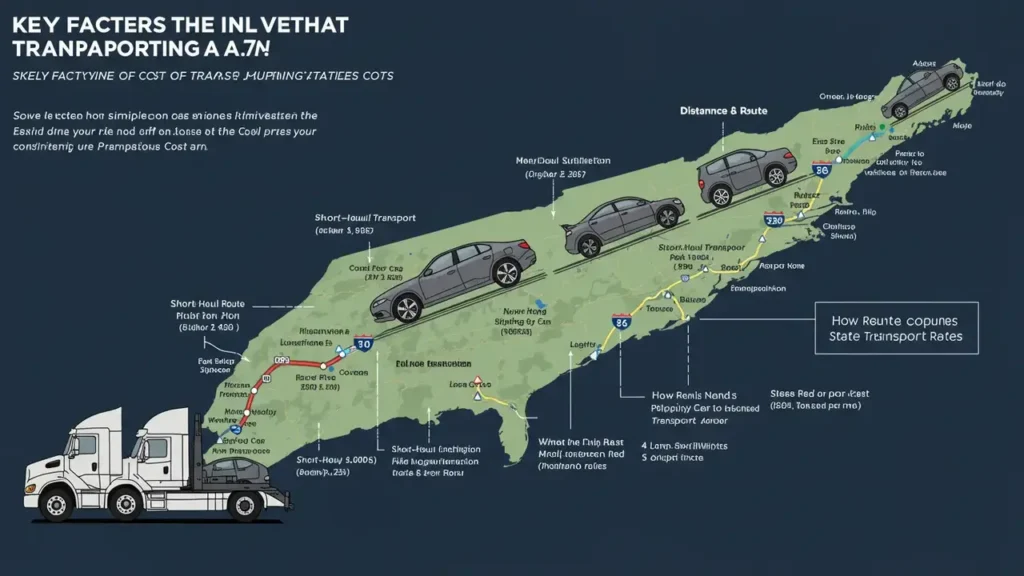
How Much Does It Cost to Transport a Car? (Price Breakdown by Distance)
Car shipping costs depend largely on how far your vehicle needs to travel. While longer distances increase the total cost, the cost per mile generally decreases as the mileage increases. This is because transport companies can distribute fuel and labor costs more efficiently over long-haul routes.
Below is a detailed breakdown of average car shipping prices based on distance to give you a better idea of what to expect.
Distance-Based Car Shipping Costs
The cost of shipping a car varies based on mileage, route availability, and transport type. Here’s a price breakdown based on real industry rates:
| Distance (Miles) | Average Cost | Cost Per Mile |
| 0 – 500 Miles | $500 – $800 | $0.80 – $1.50 |
| 500 – 1000 Miles | $800 – $1,200 | $0.70 – $1.20 |
| 1000 – 1500 Miles | $1,200 – $1,500 | $0.60 – $1.00 |
| 1500 – 2000 Miles | $1,500 – $1,900 | $0.50 – $0.90 |
| 2000+ Miles | $1,900 – $2,500+ | $0.40 – $0.80 |
Understanding the Cost Per Mile
- Short-distance trips (under 500 miles) cost more per mile because transport companies have fixed expenses like fuel, driver wages, and truck maintenance that need to be covered regardless of distance.
- Longer routes (over 2,000 miles) have a lower cost per mile since carriers can move more vehicles over a single trip, making the journey more cost-efficient.
For example:
- A 300-mile trip may cost $600 ($2 per mile), but a 1,500-mile trip may only cost $1,500 ($1 per mile).
Why Do Prices Vary Within Each Distance Range?
You may notice that the cost ranges aren’t fixed. This is because several factors influence pricing, including:
✔ Seasonal Demand – Peak seasons (summer and snowbird migration periods) drive up rates.
✔ Pickup & Drop-off Locations – Urban routes are cheaper; rural areas cost more.
✔ Transport Type – Open transport is cheaper; enclosed transport costs 40–60% more.
✔ Vehicle Type & Condition – Larger, heavier, or non-running cars cost more to ship.
✔ Expedited Shipping – Faster delivery comes with an extra charge of $200–$500.
Example Cost Estimates by Route
To give you a better idea of actual pricing, here are estimated costs for some popular state-to-state shipping routes:
✔ New York to Florida (1,200 miles) – $1,200 to $1,500
✔ California to Texas (1,500 miles) – $1,500 to $1,800
✔ Los Angeles to Miami (2,700 miles) – $2,000 to $2,500
✔ Chicago to Phoenix (1,800 miles) – $1,600 to $2,000
If your route is in high demand, you may get a lower price due to carrier availability. However, less common routes or remote areas can cost more due to limited transport options.
How to Get the Best Price for Car Shipping
If you want to save money on auto transport, consider the following tips:
✔ Be Flexible with Dates – Booking in advance and avoiding peak seasons can reduce costs.
✔ Choose Open Transport – If you don’t need enclosed shipping, this is the cheaper option.
✔ Use Terminal-to-Terminal Shipping – It requires extra effort but cuts down the price.
✔ Compare Quotes – Get estimates from multiple companies to find the best rate.
✔ Ship During Off-Peak Seasons – Fall and spring often have lower rates.
Car shipping prices aren’t one-size-fits-all, and multiple factors influence the final cost. Distance remains the most significant factor, but transport type, seasonality, and pickup/delivery locations can cause prices to fluctuate. By understanding these cost breakdowns and planning accordingly, you can avoid unnecessary expenses and get the best deal on your car shipment.
Next, let’s look at how to compare quotes from different auto transport companies and avoid hidden fees.
How to Get the Best Car Shipping Quote
Getting a car shipping quote isn’t as simple as picking the lowest price and calling it a day. Prices can vary significantly between companies, and the cheapest option isn’t always the best. Some quotes include hidden fees, while others don’t account for potential extra costs.
To avoid overpaying and ensure you get the best deal possible, you need to know how to compare quotes, spot hidden charges, and take advantage of available discounts. Here’s a complete guide to securing the most affordable and reliable car shipping rate.
Comparing Quotes from Auto Transport Companies
Not all auto transport companies price their services the same way. Some offer upfront pricing, while others provide estimates that fluctuate based on demand and availability. To ensure you get the best rate, compare quotes from multiple providers.
Top Auto Transport Companies to Compare
Here are some industry-leading car shipping companies that provide competitive pricing and reliable services:
✔ Montway Auto Transport – Known for affordability and nationwide coverage.
✔ Sherpa Auto Transport – Offers a “Price Lock Promise” to prevent cost increases.
✔ uShip – A bidding-based marketplace where carriers compete for your business.
✔ AmeriFreight – Provides additional insurance options and discounts.
✔ Ship A Car Direct – Offers a damage-free guarantee for extra security.
Binding vs. Non-Binding Quotes: What’s the Difference?
When requesting a quote, you’ll typically receive either a binding or non-binding estimate. Understanding the difference is crucial to avoid unexpected price changes.
✔ Binding Quote: This is a fixed price that won’t change unless you modify shipment details. It offers price certainty but may be slightly higher upfront.
✔ Non-Binding Quote: This is a rough estimate that can increase based on market conditions. It’s usually cheaper at first but may lead to surprise costs.
Which should you choose?
- If you want to lock in a final price, go for a binding quote.
- If you have flexibility with costs, a non-binding quote may give you a lower initial estimate.
How to Request and Compare Quotes?
✔ Get at least 3-5 quotes from different companies to compare pricing and services.
✔ Ask about additional fees (fuel surcharges, expedited delivery, etc.).
✔ Check customer reviews for feedback on pricing accuracy.
✔ Look for price-match guarantees to ensure you get the best rate.
Understanding Hidden Fees & Additional Charges
A cheap quote doesn’t always mean a cheap final price. Many auto transport companies advertise low rates but add fees that increase the final bill. Here’s what to watch for.
Common Extra Charges in Auto Transport
✔ Guaranteed Pickup Dates: If you need same-day or next-day pickup, expect to pay extra. Standard pickup windows are 1-5 days from booking.
✔ Expedited Shipping: Need your car delivered ASAP? Expedited service can cost $200–$500 extra depending on distance.
✔ Storage Fees: If you can’t pick up your car on time, some companies charge $15–$35 per day for storage.
✔ Tolls & Fuel Surcharges: Some companies pass toll and fuel costs directly to customers, increasing the final bill.
✔ Additional Insurance: While basic coverage is included, full insurance protection costs extra.
How to Avoid Surprise Fees When Booking
✔ Read the fine print on your contract to spot extra charges.
✔ Ask for a full price breakdown before confirming your booking.
✔ Choose a company with a price lock guarantee to prevent cost increases.
✔ Avoid peak season shipping to reduce price fluctuations.
Tip: If a quote seems too good to be true, it probably is. Look for companies with transparent pricing policies to avoid last-minute surprises.
Discounts Available for Auto Transport
Many auto transport companies offer discounts to make shipping more affordable. If you qualify, you can save anywhere from 5% to 20% on your shipping cost.
Common Auto Transport Discounts
✔ Military Discounts – Active-duty military members and veterans can save up to 15% with certain companies.
✔ Student Discounts – Some companies offer special rates for college students moving between states.
✔ Snowbird Discounts – Seasonal travelers (heading south for winter) can get lower rates during off-peak months.
✔ First-Time Shipper Discounts – Some providers offer a small discount (5-10%) for first-time customers.
Companies Offering Car Shipping Discounts
✔ Easy Auto Ship – Offers student and snowbird discounts.
✔ AmeriFreight – Provides discounts for military members, first responders, and seniors.
✔ Sherpa Auto Transport – Includes a free car wash reimbursement with every shipment.
How to Get These Discounts?
- Ask about available discounts when requesting a quote.
- Check the company’s website for ongoing promotions.
- Provide proof of eligibility (military ID, student ID, etc.).
To find the best car shipping rate:
✔ Compare multiple quotes from top-rated companies.
✔ Watch for hidden fees and ask for a full cost breakdown.
✔ Choose the right transport type to fit your budget.
✔ Take advantage of discounts if you qualify.
By following these steps, you can secure the best deal while ensuring your car arrives safely and on time. Next, let’s take a look at the best auto transport companies for state-to-state car shipping.
Best Auto Transport Companies for State-to-State Car Shipping
Choosing the right car shipping company is just as important as finding the best price. Not all transport providers are equal, and each company has its own strengths. Some focus on affordability, while others offer extra insurance, guaranteed pricing, or specialized services.
Below are the top-rated auto transport companies in the industry and what makes them stand out.
Montway Auto Transport – Best for Affordability
Why Choose Montway?
✔ One of the cheapest car shipping options available.
✔ Offers nationwide coverage with thousands of carriers.
✔ Provides 24/7 customer support for easy tracking.
Price Range: $500 – $1,800 (varies by distance and transport type).
Montway Auto Transport is one of the most affordable car shipping companies in the U.S. They work with a large network of licensed carriers, which helps them secure lower prices compared to smaller brokers. If you’re looking for budget-friendly transport without sacrificing reliability, Montway is a solid choice.
The only downside? No guaranteed pricing. The quote you receive can change based on market demand.
AmeriFreight – Best for Added Insurance Coverage
Why Choose AmeriFreight?
✔ Includes extra insurance protection for added peace of mind.
✔ Offers military and student discounts to lower costs.
✔ Has a strong reputation with thousands of positive reviews.
Price Range: $600 – $2,000, depending on service level and distance.
AmeriFreight is known for its strong focus on insurance protection. While most transport companies provide basic coverage, AmeriFreight offers extra insurance options to protect against damage, delays, and unexpected costs.
Their pricing is slightly higher than competitors, but if you’re shipping a high-value car or just want extra protection, it’s worth the investment.
Sherpa Auto Transport – Best for Guaranteed Pricing
Why Choose Sherpa?
✔ Price Lock Promise – The price you’re quoted is the price you pay.
✔ Offers a clean car guarantee (reimburses you for a car wash after delivery).
✔ Highly rated for customer service and transparency.
Price Range: $700 – $2,200, depending on route and vehicle type.
One of the biggest complaints with car shipping is unexpected price increases. Sherpa Auto Transport solves this problem by offering a Price Lock Promise, meaning you won’t get hit with extra fees after booking.
They also reimburse you for a car wash after transport, which is a nice bonus since cars can get dirty in open transport. The only catch? Sherpa’s pricing is slightly higher than some competitors because of their guaranteed pricing model.
Ship A Car Direct – Best for Damage-Free Guarantee
Why Choose Ship A Car Direct?
✔ Offers a damage-free guarantee, covering repair costs if your car gets damaged.
✔ Works with highly vetted carriers to ensure quality service.
✔ No upfront payment required to book.
Price Range: $600 – $1,900, depending on distance and carrier availability.
If you’re worried about damage during transport, Ship A Car Direct is an excellent option. They offer a damage-free guarantee, meaning if your car arrives with dents, scratches, or other damage, they’ll cover your repair costs.
They also screen carriers more carefully than most brokers, ensuring that only the best transporters handle your vehicle. However, their prices can fluctuate based on availability, so getting a quote early is recommended.
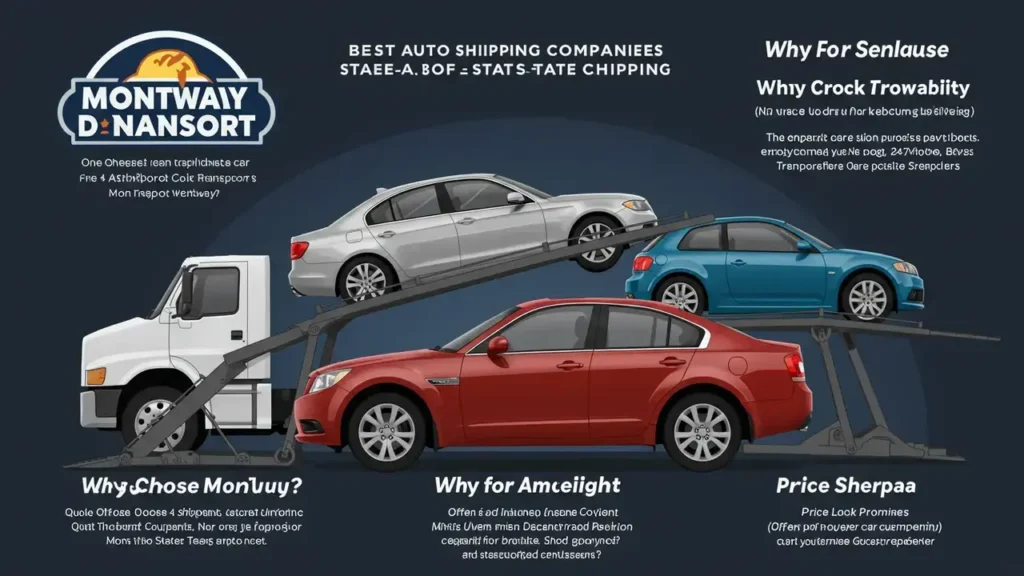
Final Tips for Securing the Best Car Shipping Deal
✔ Compare Multiple Quotes: Don’t settle for the first quote you receive. Get at least 3-5 estimates from different companies to find the best price.
✔ Look for Discounts: Many transport companies offer military, student, snowbird, and first-time shipper discounts. Always ask about available deals before booking.
✔ Book in Advance: Last-minute bookings cost more, especially during peak seasons. Schedule transport at least 2-4 weeks in advance to secure better rates.
✔ Be Flexible with Pickup & Delivery Locations: If possible, meet the carrier in a major city instead of requesting pickup or delivery in a remote area. This can reduce costs significantly.
✔ Choose Open Transport (If Possible): Unless you’re shipping a luxury, classic, or exotic vehicle, open transport is the most affordable option.
✔ Read the Fine Print: Always check for hidden fees related to storage, fuel surcharges, expedited shipping, and insurance. Make sure you know exactly what you’re paying for.
✔ Avoid Peak Seasons: If you can, ship your car during off-peak months (spring and fall) to get the lowest possible rates.
✔ Confirm Insurance Coverage: While most transport companies offer basic insurance, check if additional coverage is needed for peace of mind.
✔ Use a Reputable Company: Read customer reviews, check BBB ratings, and look for guarantees before booking. A slightly higher price is worth it for better service.
Conclusion
Shipping a car from one state to another involves multiple factors that influence the cost. From distance and transport type to seasonal demand and pickup locations, every detail affects pricing. Understanding these elements helps you make informed decisions and avoid unexpected expenses.
While cost matters, it’s equally important to choose a reputable auto transport company. Not all companies are transparent about their pricing, and some may add hidden fees after booking. Comparing multiple quotes, checking reviews, and understanding the difference between binding and non-binding quotes can save you money and prevent headaches.
Now that you have a complete understanding of how car shipping works, let’s go over some final tips to help you get the best deal possible.
